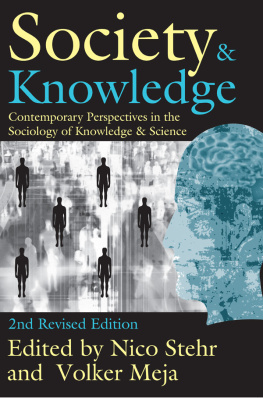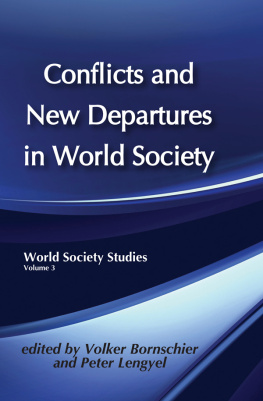Society &
Knowledge
Society &
Knowledge
Contemporary Perspectives in the
Sociology of Knowledge & Science
2nd Revised Edition
Edited by Nico Stehr
and Volker Meja
First published 2005 by Transaction Publishers
Published 2017 by Routledge
2 Park Square, Milton Park, Abingdon, Oxon OX14 4RN
711 Third Avenue, New York, NY 10017, USA
Routledge is an imprint of the Taylor & Francis Group, an informa business
New material this edition copyright 2005 by Taylor & Francis.
Previous edition copyright 1984.
copyright 1984 by Norbert Elias.
All rights reserved. No part of this book may be reprinted or reproduced or utilised in any form or by any electronic, mechanical, or other means, now known or hereafter invented, including photocopying and recording, or in any information storage or retrieval system, without permission in writing from the publishers.
Notice:
Product or corporate names may be trademarks or registered trademarks, and are used only for identification and explanation without intent to infringe.
Library of Congress Catalog Number: 2005041765
Society and knowledge : contemporary perspectives in the sociology of knowledge and science / Nico Stehr and Volker Meja, editors.2nd, rev. ed.
p. cm.
Includes bibliographical references and index. ISBN 978-1-4128-0474-5 paper)
1. Knowledge, Sociology of. 2. ScienceSocial aspects. I. Stehr, Nico. II. Meja, Volker.
BD175.S63 2005
306.4'2dc22
2005041765
ISBN 13: 978-1-4128-0474-5 (pbk)
In this second, enlarged edition of our anthology Society and Knowledge, we have added Robert K. Mertons essay on the sociology of knowledge contained in his book Social Theory and Social Structure, as well as essays by Steve Fuller, Nico Stehr, Dick Pels, Barry Schwartz and Michael Lynch and we have deleted some of the contributions that were part of the first edition.
The majority of the essays assembled in the first edition of Society and Knowledge, published in 1984, were commissioned by us for a collection entitled Wissenssoziologie published by Westdeutscher Verlag in 1981 as special issue 22 of the Klner Zeitschrift fr Soziologie und Sozialpsychologie.
The second edition of Society and Knowledge also reflects developments in the sociology of knowledge (and science) in the past two decades and the new importance its perspectives and findings now hold for a whole range of fields in the social and cultural sciences.
We would like to thank the contributors to this and the previous volume for their efforts and for their prompt responses to our many requests for assistance. We are also grateful to Judith Adler, Cecilia Benoit, Juan E. Corradi, Richard V. Ericson, F.A. Johnstone, David Kettler, Dieter Misgeld, Ronald D. Schwartz, Rosalynd Sydie, and the late Kurt H. Wolff for their support, and to the various translators who have done their best to produce readable English texts, an often exceedingly difficult task, which is rarely acknowledged as what it in fact is: a genuine intellectual accomplishment. In order to assure the terminological consistency and to further improve the readability and the accuracy of the texts, we have participated in the task of translation by editing the translated essays.
We are also grateful to Laura C. Botsford, who was of great help in the text-processing and typesetting stages of this book.
Contents
Nico Stehr and Volker Meja
Robert K. Merton
David Bloor
Michael J. Mulkay
Gnter Dux
Barry Barnes
Karin Knorr-Cetina
Norbert Elias
Steve Fuller
Dick Pels
Nico Stehr
Barry Schwartz
Paul Forman
Gernot Bhme
Michael Lynch
Nico Stehr and Volker Meja
The nature of knowledge has been a central problem of philosophy since Graeco-Roman times. Plato, for example, in Theaetetus adopts a scientific approach to knowledge and cognition, and his dualistic ontology rests on epistemological foundations. The philosophers of the French and Scottish Enlightenments recognized that all social differences had social origins and were thus subject to human control. They were aware that a wide range of social, economic and political factors shape the genesis, structure and content of human consciousness, thereby anticipating one of the major presuppositions of the modern sociology of knowledge.
In general, however, philosophers have attempted to demonstrate that a sociology of knowledge is neither possible nor desirable. Kant thus argued that while there cannot be perception without conception, the constitutive components of cognition remain a priori. Similarly, empiricists of various persuasions have maintained that scientific knowledge is warranted by direct experience unaffected by social conditions. At most, these philosophies concede that extratheoretical factors influence the genesis of ideas but not the structure and the content of thought. Otherwise quite different philosophies of thought have shared an often explicit rejection of sociological relativism and attempted to overcome doubt by placing knowledge on a firm foundation, even outside the realm of sociohistorical experience.
Philosophy has traditionally investigated the relation between knowledge and belief (or ideology), the validity and reliability of knowledge claims pertaining to the external world based on sense perception, the presuppositions required for the production of knowledge, and the use of language in the construction of knowledge claims. Knowledge and knowing in the philosophical tradition has often been reduced to the relationship between ideas and theory or the individual subject (the knower) and the object (the known). But such philosophical reflections, concerned with the possibility of knowledge about knowledge, have nonetheless provided a significant impetus for the sociology of knowledge.
The idea that all of our knowledge is a social construct is of recent origin. Similarly, the growing study of the effects of knowledge on social relations is less strongly founded in a tradition than the philosophical examination of the secure foundations of knowing. The emphasis in this introductory essay will be on the social role of knowledge in modern society.
That knowledge is of crucial and growing importance in social, political and economic relations is increasingly accepted in the social sciences. But the most serious theoretical deficiency of present theories of modern society that assign a central role to knowledge is their still rather undifferentiated treatment of knowledge. The important role that knowledge plays in these theories has not yet been matched by extended and enlightened discussion of the concept of knowledge itself. As a result, our knowledge about knowledge remains relatively unsophisticated and also lacks comprehensiveness.
The Sociology of Knowledge
The sociology of knowledge investigates the interconnections between categories of thought, knowledge claims and social reality (what Karl Mannheim called the existential connectedness










